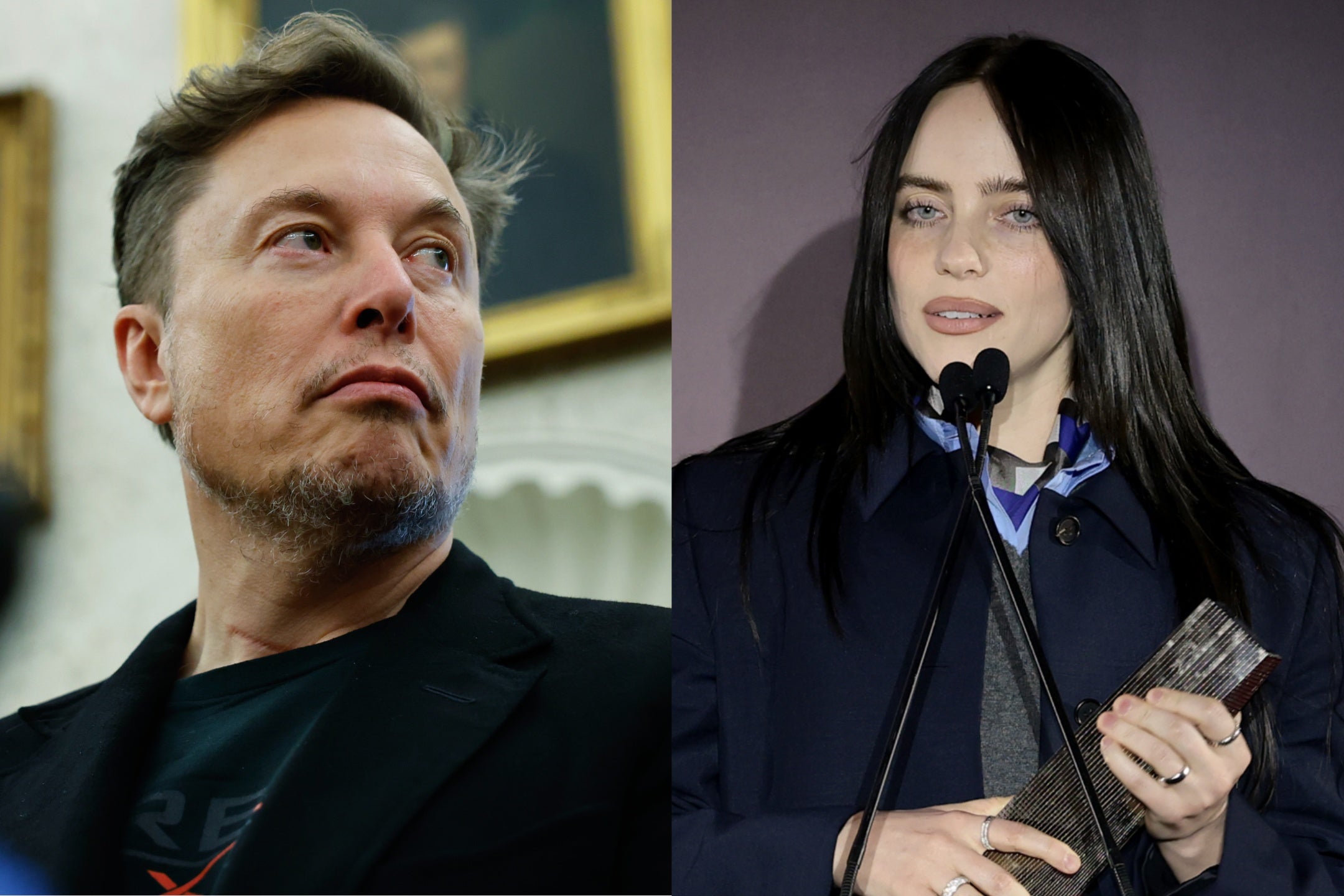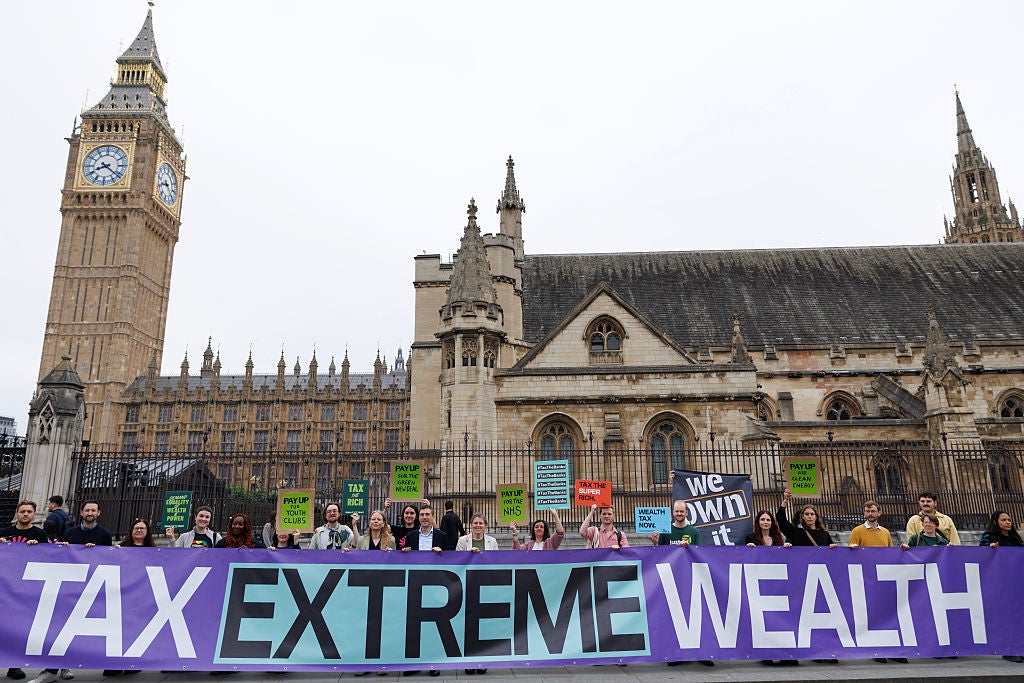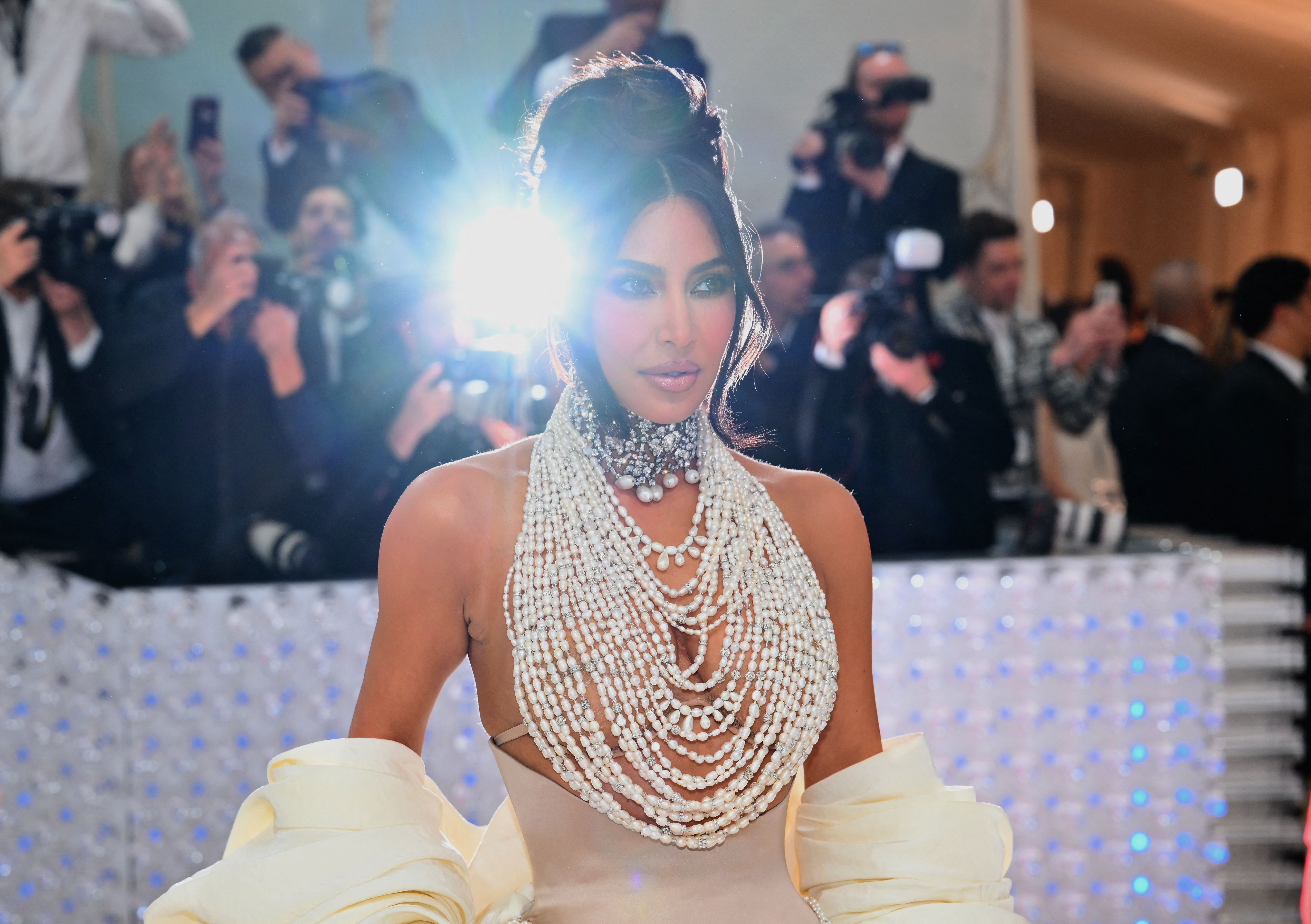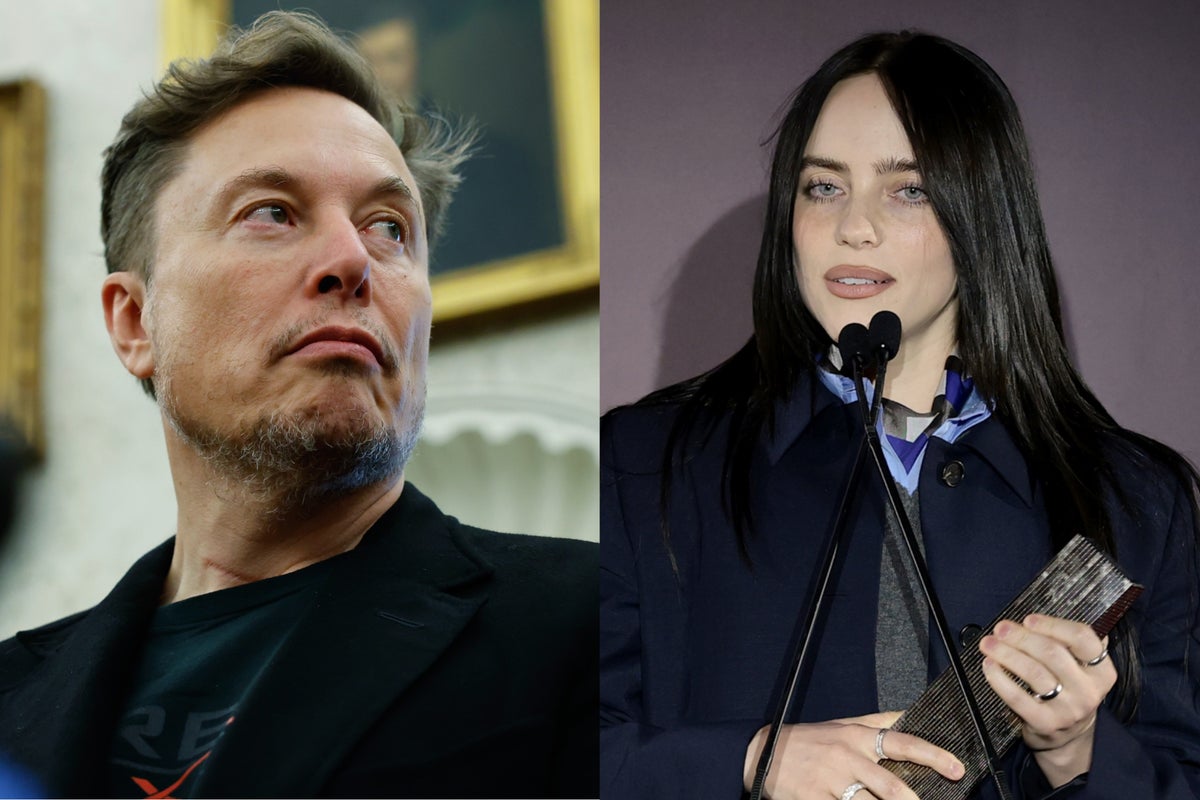- Lifestyle
As the gulf grows between the haves and the have-nots, feelings of discomfort around being rich can be a natural response. Helen Coffey reports on how ‘guilt’ about being wealthy can be a powerful motivator to take accountability and try to make amends
 Tuesday 25 November 2025 06:00 GMTComments
Tuesday 25 November 2025 06:00 GMTComments open image in galleryElon Musk lashed out at Billie Eilish after she called him out for hoarding his wealth (Getty)
open image in galleryElon Musk lashed out at Billie Eilish after she called him out for hoarding his wealth (Getty)
Stay ahead of the curve with our weekly guide to the latest trends, fashion, relationships and more
Stay ahead of the curve with our weekly guide to the latest trends, fashion, relationships and more
Stay ahead of the curve with our weekly guide to the latest trends, fashion, relationships and more
 Email*SIGN UP
Email*SIGN UPI would like to be emailed about offers, events and updates from The Independent. Read our Privacy notice
Feeling shame is a normal human emotion. And it’s the right emotion.” Julia Davies is talking about one potential response to being incredibly rich. It might seem surprising that she, of all people, should be talking about this; after all, Davies is very much in the category of the “haves”, rather than the “have-nots”, herself.
Now in her fifties, the angel investor previously worked as a lawyer before helping to set up the European arm of Osprey – the phenomenally successful premium backpack company – in 2003. She sold her stake in the business in 2018 for an undisclosed but “game-changing” sum.
Originally hailing from a working-class family in South Wales, Davies was not born into wealth. Her father, a “real grafter”, left school at 14 and became a builder, working his way up the trade until he had his own successful business. But money couldn’t be relied upon – it was a childhood of feast or famine, with multiple recessions taking their toll and the family home being at risk whenever her dad’s buildings didn’t sell.
“I think my background did make me more aware of wealth,” she muses. It meant that, when she finally came into serious money, she wasn’t content to conform to the stereotypical picture of a self-serving multi-millionaire flashing the cash on superyachts and private jets. She felt called to put that money to good use.
“Wealth shame” – the experience of feeling a deep sense of discomfort and shame around having money, whether because someone grew up in poverty, feels like a class traitor, or inherited rather than earned their fortune – has become more of a talking point in recent years. The president of the Financial Therapy Association, Christine Hargrove, says she has seen an increase in rich clients who are struggling with this issue.
“Many of them feel like they have to hide money-related aspects of their past or present, otherwise they’ll be on the front lines of the class war,” she says. “We have a lot of ways we talk about money that contradict each other – for example, we hold up passing down wealth to future generations as an important indicator of having ‘made it’ financially, but talk about individuals who inherit wealth with disdain.” Our society is full of financial double standards that “wreak havoc on individuals’ inner financial identities,” she adds.
Of course, even being able to go to a therapist to talk about wealth shame is, ironically, something that’s increasingly only accessible for the wealthy. Financial therapy is an emerging field that combines psychology and financial planning to help people manage the emotional, behavioural and mental health aspects of money. It’s not just about budgeting or investing – it’s about understanding your relationship with money and how it affects your life, decisions and well-being. But as demand for mental health services has skyrocketed, so the price for private therapy treatment has risen, climbing by 34 per cent since 2022, according to one survey of UK practitioners. A course of 12 sessions now costs a whopping £1,550 on average – that’s £129 per 50 minutes.
 open image in galleryWealth inequality should be tackled by taxing the rich, according to campaigners (Getty Images)
open image in galleryWealth inequality should be tackled by taxing the rich, according to campaigners (Getty Images)Meanwhile, wealth inequality, already significant, keeps on growing. The UK’s wealth gap has widened by 50 per cent in that last eight years and the country ranks seventh for unequal income among OECD countries. The UK’s 50 richest families hold more wealth than the poorest half of the population, totalling 34 million people; the UK’s two richest billionaires are richer than the entirety of The Times rich list back in 1990. It’s little wonder that a recent report from the Fairness Foundation concluded that increasing wealth inequality in the UK could be a “major driver of societal collapse” within the next decade.
A January report from Oxfam International titled “Takers Not Makers”, released right before the World Economic Forum’s annual gathering in Davos, Switzerland, found that billionaires grew wealthier three times faster in 2024 than in 2023, pointing to an increased concentration of resources globally.
The correct reaction to all of this as a wealthy person is to feel shame, argues Davies. “No one’s going to love me for saying that, but I think we accept extreme levels of bad behaviour from rich people,” she says. Or perhaps we should call it “guilt”. As Hargrove points out, “Guilt means you’ve done something wrong. Have you? If so, guilt can be a powerful motivator to take accountability and try to make amends. Shame means you ARE wrong, that you fundamentally are someone who is unacceptable, unwanted, unredeemable.”
Davies agrees that it’s “not about being embarrassed about having wealth if you’ve worked hard for it, or your parents have worked hard for it” (though, as we know, that isn’t always the case). But she does think that the injustice of inequality should make those at the top of the food-chain feel guilty if they’re hoarding wealth, rather than using it to make things better.
Julia Davies, investorI think we accept extreme levels of bad behaviour from rich people
“I take my wealth seriously,” she says. “I enjoy it, but it also gives you this ability to do things which most people don’t have the ability to do. To have that and not do it – or to actually choose to use your wealth to make things worse, like these extreme over-consumption lifestyles… I think they should be ashamed.” Davies challenges the inherent belief that many of us carry – that it is somehow “natural” for rich people to be selfish with what they have – by summing it up thus: “Just because you’re rich, you don’t have to be an a***hole.”
It’s a sentiment shared by Grammy and Oscar winner Billie Eilish, who shamed the ultra-wealthy to address more of the world’s issues as she accepted a music award at this year’s WSJ Magazine Innovator Awards.
“We’re in a time right now where the world is really, really bad and really dark and people need empathy and help more than, kind of, ever, especially in our country,” Eilish said to an audience that included Meta CEO Mark Zuckerberg and his wife Priscilla Chan. “I’d say if you have money, it would be great to use it for good things, maybe give it to some people that need it. And if you're a billionaire, why are you a billionaire? And no hate, but give your money away, shorties.”
Through her Changemaker Program, Eilish has worked with the nonprofit Reverb for years on its Music Decarbonization Project and Music Climate Revolution initiative, alongside artists ranging from Dead & Company to Harry Styles.
Similarly, Davies is doing her bit as a maker, not just a taker, having founded environmental fund We Have The POWER, which focuses on rewilding and nature restoration. It’s also why she became involved with Patriotic Millionaires, a network of wealthy people in the UK who are campaigning to be taxed more. According to their reporting, 80 per cent of millionaires support a wealth tax of 2 per cent on anything over £10m. The aim is to “leverage the voice of wealth to build a better Britain by changing the system to end extreme wealth and make those with it make their fair and proper contribution.”
Today, just as it was in the Victoria era, philanthropy is the way that most ultra-wealthy people “do their bit” for society and assuage the guilt that can be triggered when one lives in luxury while others struggle. But donating money to charitable causes “is never going to change society and the root causes of problems that we really need to deal with if we want a better country,” argues Phil White, a former engineer who made his millions after selling the consulting firm he’d co-founded.
Philanthropy isn’t, for starters, democratic. It’s not in any way fairly distributing the wealth, directed instead by the whims of whatever a particular individual feels passionately about, whether that be the arts or a specific species of bird. It also addresses the symptoms, rather than the underlying causes, of a broken and unequal society. “Philanthropy alone dabbles at the edges; the scale isn’t big enough,” says White. “Only governments can actually do that. That’s why I believe we need wealth taxation.”
 open image in galleryPhilanthropy will never solve the root causes of society’s problems, says Patriotic Millionaires (AFP via Getty Images)
open image in galleryPhilanthropy will never solve the root causes of society’s problems, says Patriotic Millionaires (AFP via Getty Images)He joined the Patriotic Millionaires network after his own reckoning with wealth came amid the pandemic, when it became clear that a lot of people were having a tough time. “We saw people in inner cities really struggling with day-to-day life while I was out in the countryside enjoying the birdsong,” he recalls. “We weren’t in overcrowded housing; my income came from wealth, so I wasn’t working at the time. My life was really very comfortable during that period.”
All that made the gap “more stark”: “What we saw was this divide, with the wealthy getting wealthier and the poor getting poorer, effectively.” Did that feeling of unfairness and injustice – and, perhaps, the guilt that it sparked – spur White into wanting to lobby for change? “Absolutely it did, yes. That was a very direct causation.”
Indeed, guilt, as much as it has negative connotations, can be a hugely positive force. As Dr Lawrence Howells, clinical psychologist and author of Understanding Your 7 Emotions, puts it: “Guilt serves important functions in our lives and in our wider society, and is usually helpful.” He calls it “an energising emotion: it drives us to act. The most effective way to reduce guilt is to undo our behaviour, make amends, atone or apologise.”
Phil White, Patriotic MillionairesIf you use that guilt to do something positive, it can be a win for everybody
In the case of feeling guilt or shame about having wealth – particularly reaching the level of wealth where your money sits there making money, deriving you a passive, unearned income – that feeling can drive someone to “atone” by campaigning for a fairer society or channelling that money into causes and projects that will have a positive impact.
“Feeling guilty about something, if you don’t do anything about it, is a very negative emotion,” agrees White. “Whereas if you use that guilt to do something positive, then absolutely – it can be a win for everybody.” ’
Even from a less altruistic stand point, using at least some wealth to try and improve the state of the world seems to have a much better feel-good effect than simply letting it stack up or splurging it on ever more indulgent extravagances.
“Overconsumption is just like junk food – it’s not really very satisfying at all,” says Davies. “I think true happiness in life comes from doing good stuff with good people. You get way more pleasure from that than from looking for the next hit of buying something.”
Money may not buy you happiness, but it could just buy you the power to create a fairer world.
More about
WealthphilanthropyrichJoin our commenting forum
Join thought-provoking conversations, follow other Independent readers and see their replies
Comments


